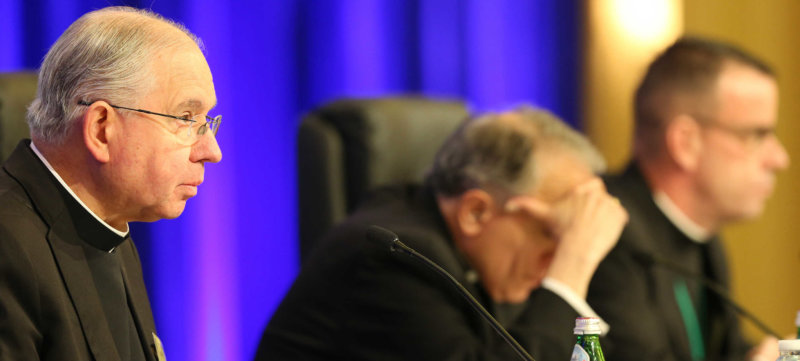WASHINGTON — Pledging to “heal and protect with every bit of the strength God provides us,” the U.S. bishops’ Administrative Committee Sept. 19 outlined actions to address the abuse crisis, including approving the establishment of a third-party confidential reporting system for claims of any abuse by bishops.
It also instructed the U.S. bishops’ canonical affairs committee to develop proposals for policies addressing restrictions on bishops who were removed or resigned because of allegations of abuse of minors or adults.
It initiated the process of developing a code of conduct for bishops regarding sexual misconduct with a minor or adult or “negligence in the exercise of his office related to such cases.”
The committee also said it supported “a full investigation into the situation” surrounding Archbishop Theodore E. McCarrick, former cardinal-archbishop of Washington, “including his alleged assaults on minors, priests and seminarians, as well as “any responses made to those allegations.”
The statement, released by the U.S. Conference of Catholic Bishops, came out of the committee’s semiannual meeting held Sept. 11-12 at USCCB headquarters in Washington.
The Administrative Committee consists of the officers, chairmen and regional representatives of the USCCB. The committee, which meets in March and September, is the highest authority of the USCCB outside of the full body of bishops when they meet for their fall and spring general assemblies.
“This is only a beginning,” the committee said in its Sept. 19 statement. “Consultation with a broad range of concerned parents, experts and other laity along with clergy and religious will yield additional, specific measures to be taken to repair the scandal and restore justice.
“We humbly welcome and are grateful for the assistance of the whole people of God in holding us accountable,” the committee said.
The committee acknowledged its members had assembled for their meeting in Washington at a “time of shame and sorrow.”
“Some bishops, by their actions or their failures to act, have caused great harm to both individuals and the church as a whole,” the committee said. “They have used their authority and power to manipulate and sexually abuse others.
“They have allowed the fear of scandal to replace genuine concern and care for those who have been victimized by abusers,” it continued. “For this, we again ask forgiveness from both the Lord and those who have been harmed. Turning to the Lord for strength, we must and will do better.”
Full descriptions of the actions the committee took are as follows:
— Approved the establishment of a third-party reporting system that will receive confidentially, by phone and online, complaints of sexual abuse of minors by a bishop and sexual harassment of or sexual misconduct with adults by a bishop. It will direct those complaints to the appropriate ecclesiastical authority and, as required by applicable law, to civil authorities.
— Instructed the USCCB Committee on Canonical Affairs and Church Governance to develop proposals for policies addressing restrictions on bishops who were removed or resigned because of allegations of sexual abuse of minors or sexual harassment of or misconduct with adults, including seminarians and priests.
— Initiated the process of developing a code of conduct for bishops regarding the sexual abuse of a minor; sexual harassment of or sexual misconduct with an adult; or negligence in the exercise of his office related to such cases.
— Supported a full investigation into the situation surrounding Archbishop McCarrick, including his alleged assaults on minors, priests, and seminarians, as well any responses made to those allegations. “Such an investigation should rely upon lay experts in relevant fields, such as law enforcement and social services.”
As the initiatives get underway, the Administrative Committee asked all U.S. bishops “to join us in acts of prayer and penance.”
“This is a time of deep examination of conscience for each bishop. We cannot content ourselves that our response to sexual assault within the church has been sufficient. Scripture must be our guide forward. ‘Be doers of the word and not hearers only,'” it said, quoting the Letter of James.
“In all of this,” no one — including the bishops — can “lose sight of those who have suffered from those who have acted or failed to act as the Gospel demanded,” it said.
“For survivors of sexual abuse, these days may reopen deep wounds. Support is available from the church and within the community,” it emphasized.
The committee reminded all in the church that victims assistance coordinators are available in every diocese to help victim-survivors and their families find resources.
Since the bishops first adopted “the Charter for the Protection of Children and Young People” in 2002, the committee said, “hundreds of dedicated people … have been working with the church to support survivors and prevent future abuse.”
It said anyone who has been abused must “never hesitate to also contact local law enforcement.”
“If you don’t feel comfortable for any reason with the church providing help, your diocese can connect you with appropriate community services,” the committee said. “With compassion and without judgment, the bishops of the United States pledge to heal and protect with every bit of the strength God provides us.”
The committee concluded: “Acting in communion with the Holy Father, with whom we once again renew our love, obedience and loyalty, we make our own the prayer of Pope Francis in his Aug. 20 letter to the people of God, ‘May the Holy Spirit grant us the grace of conversion and the interior anointing needed to express before these crimes of abuse our compunction and our resolve courageously to combat them.'”
Copyright ©2018 Catholic News Service/U.S. Conference of Catholic Bishops.


